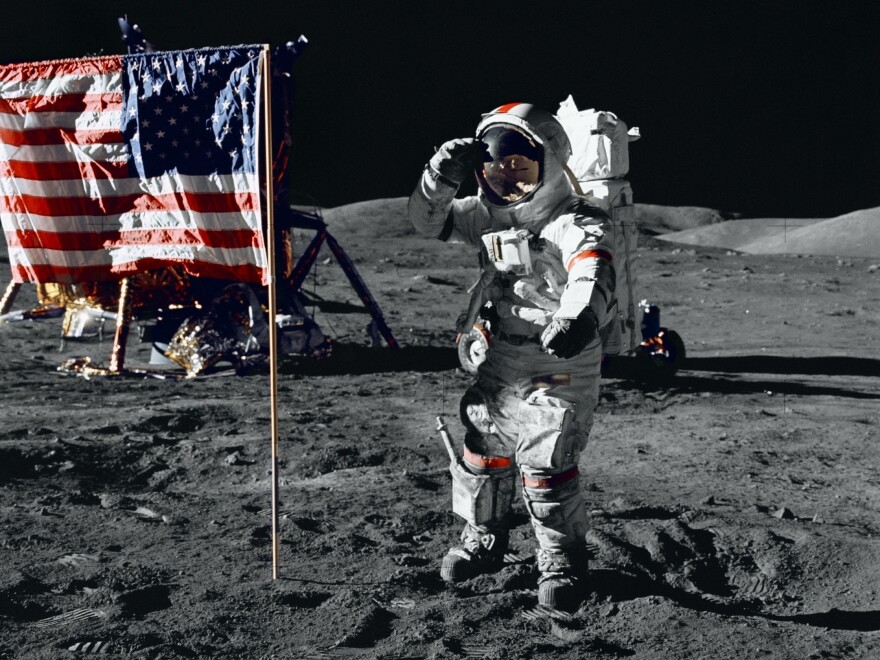The last person to leave footprints on the moon has died. NASA reported that Gene Cernan died Monday at the age of 82, surrounded by his family.
Gene Cernan flew in space three times, including twice to the moon. Cernan was big, brash and gregarious. And if he hadn't been lucky, he could have missed his chance to walk on the moon.
Cernan challenged himself his whole life. When he entered the military, he chose to be a naval aviator. Landing on an aircraft carrier is perhaps the hardest thing to do in aviation. Cernan did it because it wasn't easy. He said he was constantly pushing himself to do better and be better.

"My dad always used to say, 'Just go out and do your best. You're not going to be better than everyone at everything.' And he was right," Cernan said, "I wasn't. But he was also right one other time when he said, 'Someday you're going to surprise yourself. Just do your best and someday you're going to surprise yourself.' "
Cernan's final trip in space was also the final time NASA sent people to the moon, the Apollo 17 mission, which took off on Dec. 7, 1972.
Four days later, Cernan landed the lunar module on the moon with astronaut Harrison "Jack" Schmitt. Cernan couldn't hide his enthusiasm as he exited the spacecraft, saying, "We'd like to dedicate the first steps of Apollo 17 to all those who made it possible. Oh my golly! Unbelievable!"
Decades later, Cernan reflected on that moment in a 2015 NPR interview, no less thrilled to be the last, rather than the first, to go there. "The first steps had been made by others long before I got there. But those were my first steps."
Cernan is one of only three people to travel to the moon twice (Jim Lovell and John Young were the others). Before Apollo 17, he flew on Apollo 10, which was the mission just before the first lunar landing.
On Gemini 9 in 1966, he conducted the second American spacewalk (which almost ended in disaster). Cernan had trouble controlling his body in the weightlessness of space. He became exhausted. His visor fogged up and he barely had the strength to get back into the capsule and close the hatch. "Fate played another trick because I might not have come home from that flight. We didn't know much about what we're doing [yet]."
Dreaming big and working hard were two things Cernan always did. He grew up in Chicago. Neither of his parents went to college, but he earned several degrees in engineering.
Despite Cernan's technical background, his time on the moon and in space forever altered his life. Cernan said he gained a new perspective, because "when you leave the Earth, it's not only technologically different — it's philosophically different and it's spiritually different."
Many astronauts had difficulty describing what it was actually like to be in space — not in the technical sense, but in finding the words to share that remarkable experience. He chronicled some of them in his 2016 documentary, Last Man on the Moon.
"Many of the astronauts didn't really know how to describe that because that's not what they were going there for," said Francis French of the San Diego Air and Space Museum, who has written many books on the space program. "Gene Cernan in the decades after his mission really reflected on that and he [very well described] what that's like."
There's something else about Cernan: He had the opportunity to land on the moon during an earlier mission, Apollo 16, as the pilot. But he turned it down, because he wanted to be commander, in charge of the mission.
"I sort of felt like I'd been an underdog most of my life," he recalled. "[Achieving the command of Apollo 17], I proved to myself that I was good enough. That I could get the job done. That was a big point in my life."
Cernan spent his post-NASA life trying to inspire young people. He once said, "Dream the impossible — and go out and make it happen. I walked on the moon. What can't you do?"
Copyright 2021 NPR. To see more, visit https://www.npr.org. 9(MDEwMTk5OTQ0MDEzNDkxMDYyMDQ2MjdiMw004))




